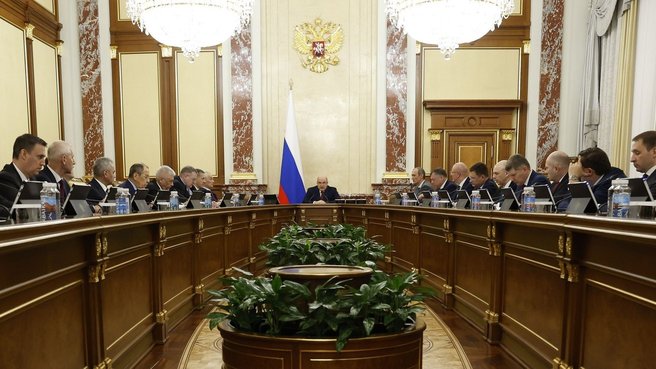The agenda: Increasing social benefits for medical professionals, supporting the long-term caregiving programme, purchasing vehicles for the Donetsk People’s Republic, amendments to tax legislation, budgetary funding to stockpile additional grain batches for the agricultural produce intervention fund.
Mikhail Mishustin’s opening remarks:
Good afternoon, colleagues,
Before we start discussing the agenda, I would like to inform you about a decision that has been made.
In accordance the President’s instruction, we have increased special social benefits for medical professionals. These benefits have been supplementing their salaries since 2023.
Doctors working in small towns, villages and communities with a population of under 50,000 will receive up to 50,000 roubles each. Nurses and orderlies will receive up to 30,000 roubles each.
Doctors working in communities with a population of 50,000 to 100,000 will receive 29,000 roubles each, with each nurse and orderly receiving 13,000 roubles.
We started allocating this funding on 1 March, and medical personnel will receive their March benefits in April.
This measure will cover over 200,000 staff members at hospitals and outpatient clinics. Acting on the President’s initiative, we will ensure that medical organisations allocate at least 50 percent of their payroll funds to medical workers’ salaries starting from 1 April. At the same time, their salaries should remain at least at the same as last year. I urge you to closely monitor this process in all Russian regions.
Our doctors, nurses and other specialists help keep people healthy, and their work deserves the utmost respect. It is important for them to receive all the necessary funding on time and in full.
Today’s agenda includes the issue of providing support for the elderly as well as disabled people.
In his Address to the Federal Assembly, the President emphasised the need to provide additional funding for the long-term caregiving system, to ensure its high standard and to prioritise individuals who are in greater need of this assistance.
This includes senior citizens and people with impaired health who struggle with household chores, obtaining food, washing and maintaining basic hygiene. Specialists from caregiving services will take care of these patients according to their individual needs and will also train family members to provide care.
The federal budget allocates about 12 billion roubles for the implementation of the long-term caregiving system. Additionally, the Government will provide the regions with over 4.2 billion roubles for these purposes.
The additional funding will enable comprehensive household social and medical support for over 2,500 individuals, and in total about 173,000 people will benefit from such support.
We will continue to promote this practice nationwide.
Another issue concerns the support for the new regions of the Russian Federation. The President stressed that no detail should be overlooked in the efforts to revive these regions. Every aspect of people’s lives, including the conditions in which they live, study, work, and raise their children, is important.
Taking into account the significant progress in rebuilding housing, utilities and social infrastructure in the Donetsk People’s Republic, the Government will allocate 1 billion roubles for the purchase of Russian-made vehicles. As a result, the region’s primary healthcare centres will receive about 500 ambulance vehicles this year; paramedics will be able to respond faster and provide emergency care to patients at their homes.
Additionally, 200 light trucks will be purchased to meet the region’s needs. These vehicles have enhanced off-road capabilities and can be utilised for a wide range of tasks, such as delivering humanitarian aid and medicines.
We must do everything we can to ensure that the people living and working in the republic receive prompt access to necessary services.
Today we have on our agenda a bill that proposes amendments to tax legislation. Following the President’s instruction, we are continuing to reduce the regulatory and administrative burden on individuals and businesses.
This primarily pertains to large families. Parents will no longer need to request their property tax benefits as these benefits will be automatically applied. This automatic procedure will be implemented through a centralised transfer of the necessary information to the Federal Taxation Service.
Furthermore, the tax on interest earned from long-term bank deposits (more than one year) will be reduced. The non-taxable limit on such income will be deducted from the holder’s income every year, not only upon the deposit’s maturity, as was previously the case.
Some proposals aim to support businesses. Companies that report zero profits during a specific period will not have to submit simplified accounting forms and records.
There are plans to expand the range of companies that can opt for tax-monitoring schemes in order to avoid additional audits, mistakes and extra deductions.
Companies paying 80 million roubles, instead of 100 million, in annual taxes will be eligible for this procedure. Their annual turnover and asset value should add up to 800 million.
We hope that these and other measures outlined in the new bill will support individuals and companies, helping them achieve various important objectives.
Our next topic deals with assistance for our agricultural producers. The President has highlighted record-breaking harvests over the past two years, including over 157 million tonnes of grain harvested in 2022 and 147 million tonnes last year.
These agricultural production volumes have an impact on the domestic market as well as on the world market. We use a wide range of measures to enhance the profitability of our farms. These measures include providing subsidies to farmers who grow grain crops and increase their volumes for the federal agricultural produce intervention fund.
This year, we will allocate an additional 7 billion roubles for these purchases. This will allow us to stabilise agricultural produce prices in Russia and reduce potential risks for consumers and processing companies, including the bread-baking and flour-grinding industry. Additionally, this will help ensure food security, enabling people to choose high-quality and diverse food items.
I ask the Ministry of Agriculture to monitor how effectively this funding is disbursed.












